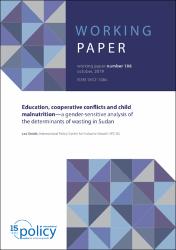Please use this identifier to cite or link to this item:
https://repositorio.ipea.gov.br/handle/11058/15272Files in This Item:
| File | Description | Size | Format | |
|---|---|---|---|---|
| en_WP186_Education_cooperative_conflicts_and_child_malnutrition.pdf | 652.35 kB | Adobe PDF |  View/Open |
| Title: | Education, cooperative conflicts and child malnutrition—a gender-sensitive analysis of the determinants of wasting in Sudan |
| Authors: | Smidt, Lea |
| Abstract: | "Sudan has one of the highest wasting rates globally, reflecting endemic child malnutrition. Cross-national research has identified gender inequality as a common predictor for such child health deprivations. At household level, studies support this finding by showing that maternal education improves children’s health outcomes. Yet authors disagree on whether education measures a woman’s economic situation, her capacity or her status. In addition, mothers’ education is examined irrespective of fathers’ education; thus, the gender perspective is incomplete. Therefore, this paper investigates how and through which channels parents’ respective and relative levels of education affect wasting. The central argument is that a mother’s level of education reduces her children’s risk of wasting independent of the father and their household’s economic situation because education improves the mother’s nutritional knowledge and bargaining power. Using a two-stage residual inclusion approach, my findings from a sample of nearly 8,000 Sudanese children corroborate my argument: maternal education decreases the likelihood of wasting via the quality of a child’s diet and by increasing the mother’s bargaining power, after controlling for household wealth and food security. By contrast, paternal education has no effect on a child’s diet or nutritional status. Children of fathers with a university diploma are at an even greater risk of wasting. Mothers’ and fathers’ relative levels of education do not influence children’s nutritional outcomes. These results suggest that interventions should focus on empowering women through capacity-building and material support and by enhancing their legal and perceived autonomy from their husbands to increase their decision-making power". (...) |
| metadata.dc.rights.holder: | International Policy Centre for Inclusive Growth United Nations Development Programme |
| metadata.dc.rights.license: | O texto e dados desta publicação podem ser reproduzidos desde que as fontes sejam citadas. Reproduções com fins comerciais são proibidas. |
| metadata.dc.type: | Working Paper |
| Appears in Collections: | Publicações do IPC-IG |
Items in DSpace are protected by copyright, with all rights reserved, unless otherwise indicated.

